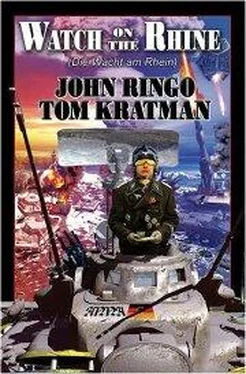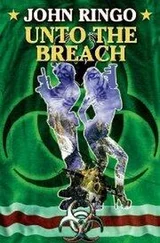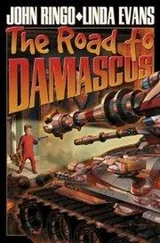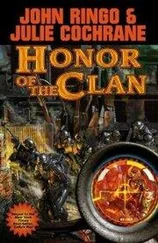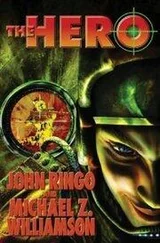“Can you note the color of the earth?”
“Yes, Rinteel.”
“Can you change colors in your perceptions? Modify what you perceive?”
“I can.”
“Good. I want you to modify your perceptions such that the earth and sky are all green.”
“Very well, Rinteel. I have done so.”
“Good… very good. Thank you, Brünnhilde . What colors remain?”
“Just the silver shapes of the Posleen warships.”
“Excellent. Now, Brünnhilde , I want you to expend all but two of your remaining KE projectiles. But you are not to aim at the green.”
Instantly the tank’s railgun raised to near vertical, the turret swerved, and the tank itself began to shudder with the pulses of death being sent aloft.
The Indowy smiled then; madness had overtaken him fully despite his philosophical sleight of hand. When the tank was finally destroyed by Posleen counterfire, he would still be smiling.
Spandau Prison, Berlin, Germany, 5 March 2008
The sound of alien claws on the concrete floors and reverberating off of the stone walls and steel doors of the ancient prison filled Günter Stössel with dread.
The guards were gone; had left laughing, in fact, over the presumed fate of the charges they were deliberately abandoning to the Posleen. Neither pleas nor offers moved the warders. Though no Sigrunen flashed from their collars they were perhaps more in tune with the mindset of many of those who had worn the double lightning flashes in earlier times. Certainly they were pitiless with those of the prisoners who were serving sentences for collusion with the Darhel.
Shivering in his cell, for without the prison staff the heat had shut down, Günter started at the sound of screaming coming from down the corridor and around a bend. The words of the screamer, to the extent there were words, were indistinct. Most of the sound, in any case, was a mindless howl, pleading for life.
The howl suddenly cut off. Günter thought he might have heard the sound of something hitting the concrete floor, but could not be sure. He was sure that he did hear a concerto of snarling, snapping feasting. He also heard many more screams and pleas, and more articulate ones, coming from other prisoners.
The sounds of claws on concrete came a bit closer. The screaming pleas, such as one might have heard in some nineteenth-century madhouse, grew ever louder and ever closer.
The Posleen cosslain, when it came to Günter’s cell and blasted the lock on the door, found him hiding under a blanket in a far corner of the cell. The cosslain simply removed the blanket and dragged him by the hair to the corridor outside, where all could feed without the jostling that often led to internal fighting among the People.
After the terrified wait, after the growing concert of shrieking and pleading and the patter of falling heads, Günter was no doubt quite mad by the time the Posleen arrived at his cell. When the cosslain drew his boma blade and swept it through Günter’s neck, severing head from torso, Günter was as indifferent as was the cosslain.
Stockholm, Sweden, 12 March 2008
“All is lost,” muttered the chancellor hopelessly.
Mühlenkampf shrugged in his hospital bed. “We have lost a battle, Herr Kanzler . But we have not lost the war.”
What universe does this soldier live in? wondered the chancellor.
Mühlenkampf as much as read the chancellor’s thoughts. He answered them with, “A battle is not a war, nor is even a series of battles a war, Herr Kanzler . This war will not be over until the last of us is dragged, biting and kicking from the last trench or the last hole after we have expended the last round of ammunition.”
“We have saved nearly twenty million of our own people here; a like number have found safety in the Alps. Add to that several million more French and Poles and Czechs and Italians.
“The people we saved, too, are the most precious: women to breed more soldiers in abundance, wise farmers, skilled workers. And enough soldiers have been saved to make a seed from which mighty armies will grow. North and south we shall grow again; we shall marshal and build our strength. And the enemy has no chance of digging us out from either Scandinavian snows or Alpine fortresses; they’ll starve first.
“But we will not starve, Herr Kanzler . Oh, yes, rations may be a little scant and bland until we can break out from our mountain fastnesses. So what? The Volk had become pudgy with prosperity, and a lean wolf is a fierce one.
“No, Herr Kanzler , the war in not lost, but only beginning.”
* * *
The remnants of Division Charlemagne had made it to safety; a mere two thousand from a division that had once boasted over twenty thousand, and had lost nearly twice that number in action. In a relatively small corner of a huge Stockholm Sub-Urb, the survivors among the French civilians warmed to and welcomed the tiny band that was all that remained of a once great and courageous army. Already, boys and girls as young as twelve were being turned into something their people needed to survive: soldiers.
To Isabelle it was an abomination, to take those so young and twist their hearts and minds to make them killing machines. An abomination it was, but still, she knew, it was not the worst form of abomination. She could not like it; she could not even keep herself from hating it. And yet she knew she could accept it, for the alternative was far worse.
She thought about an old American science fiction series, Journey to the Stars or some such title. She had once enjoyed it greatly, though she found few of the plots believable two minutes after a show had ended. Nor had much of the philosophy of the show really moved her.
Yet two things had. The lesser of these was “having is not, after all, so pleasing a thing as wanting.” Much more important, especially in her current circumstances, was the simple line, “Survival cancels out programming.”
She walked to the small cubicle in her apartment, barely more than a large closet really, where Thomas slept when he had no duties with Charlemagne. Opening the door slightly, she peered in on her resting son.
Sensing that Thomas was asleep, she risked opening the door wide enough to enter. Not wanting to take a chance on awakening him, as she might have had she sat on the bed, Isabelle instead sat on the floor. She was tall enough, and the bed low enough, that she could still reach out easily to gently stroke her son’s hair.
“Survival cancels out programming,” she thought. I was programmed by my mother who had seen France lose three wars in a row and thought that the entire exercise was futile. My mother was programmed by her mother who had feared she would never marry because the Great War had created such a shortage of men. And you, my dear son, were programmed by me.
I made you to be a fine boy, warm and kindhearted and good. And so, when the time came, and you needed to do something horrible to prevent something worse, you could not. But it was my hand that froze yours, my loving mother’s heart that pierced your own. The guilt, my son, is all mine. And none of the blame is yours.
And so, tomorrow when you awaken to breakfast… and for every morning to come, you will find a mother who will give her heart and soul into making you what I never wanted you to be: a soldier. You will find a mother who will advise you and prompt you and support you in becoming the best French soldier in a century.
For “Survival cancels out programming.”
Es ist zu Ende, thought Hans. It is over: the pain, the war, the struggle. Well, there are still a few things to do.
Читать дальше
